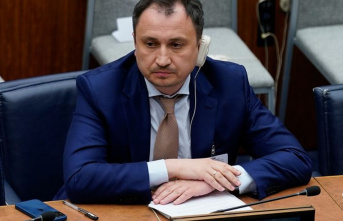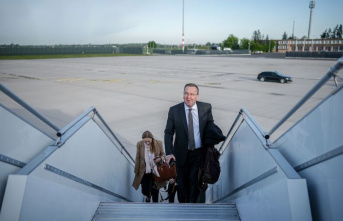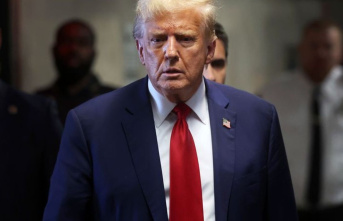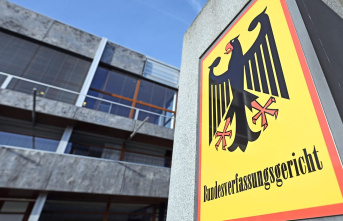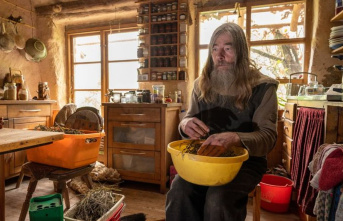Since the war began in February, Russia has reportedly fired almost 4,700 rockets at Ukraine, leaving large parts of the country in ruins. "Hundreds of our cities have practically burned down, thousands of people have been killed, hundreds of thousands have been deported to Russia," said President Volodymyr Zelenskyy. Both the head of state and the general staff in Kyiv also reported that heavy fighting continued, especially in the Donbass region in the east of the country.
Last Tuesday alone, Russia fired almost 100 rockets at Ukraine. "Hundreds of different rockets against our cities, against residential buildings, against companies, against power plants," said Zelenskyj in a video message to the international organization of Francophonie - an association of French-speaking countries whose representatives met in Djerba, Tunisia. As a result of these attacks, more than 20 million people were temporarily without power.
"Millions of people have left Ukraine to seek protection from the war in other countries," said Zelenskyy. He asked the member states of Francophonie for help. "Ukraine really wants peace. But to restore peace, we need support." A return to peace is possible "if everyone in the world understands that nobody in the world deserves a single day of terror."
More bitter fighting in Donbass
The fierce fighting in the Donbass in eastern Ukraine continues, according to Zelenskyy. The area around Donetsk in particular is heavily contested, he said in his daily video speech on Sunday evening. "Although there are fewer attacks due to the worsening weather, unfortunately the number of Russian artillery raids remains high." The General Staff in Kyiv had previously reported continued clashes on various front sections in the east of the country. At Luhansk, several Russian advances were fended off, it said. The information could not be independently verified.
Meanwhile, the Ministry of Defense in Kyiv has contradicted speculation by Western media and military officials that there could be a pause in fighting on the fronts in winter. "Anyone who talks about a possible 'pause in hostilities' because of sub-zero winter temperatures has probably never sunbathed on the southern coast of Crimea in January," the agency said on Twitter.
Kyiv: Russians expand positions and steal bicycles
After withdrawing to the east bank of the Dnipro River near Cherson in southern Ukraine, Russian soldiers are building new defensive positions there, according to information from Kyiv. At the same time, in the Kakhovka district, for example, they have increasingly started stealing the civilian population's means of transport, the Ukrainian general staff said in Kyiv on Sunday. "They steal people's private cars, motorcycles and even bicycles," the statement said.
IAEA team wants to examine the Zaporizhia nuclear power plant for damage
A team from the International Atomic Energy Agency (IAEA) wants to examine the Ukrainian nuclear power plant at Zaporizhia for possible damage on Monday and document the extent of the weekend's explosions. The largest nuclear power plant in Europe, occupied by Russian troops, was shaken by dozens of grenade hits on Saturday and Sunday. In the months before, the nuclear power plant had come under fire several times. Ukraine and Russia blame each other for this.
Germany offers Poland support
Federal Defense Minister Christine Lambrecht (SPD) wants to help Poland with the Patriot defense system after the rocket hit the border area with Ukraine. "We offered Poland support in securing the airspace - with our Eurofighters and Patriot air defense systems. We are already in Slovakia with them - we want to extend our presence there until the end of 2023, possibly even beyond that." , said Lambrecht of the "Rheinische Post" and the "General-Anzeiger".
A rocket fell on Tuesday in the Polish village of Przewodow, just six kilometers from the border with Ukraine. Two civilians died. Western governments believe it was a stray Ukrainian anti-aircraft missile used to defend against Russian military attacks.
That will be important on Monday
An international donor conference will be organized on Monday in Paris for the Republic of Moldova, an important destination country for war refugees from neighboring Ukraine. It is about further aid commitments for the former Soviet republic. Federal Foreign Minister Annalena Baerbock (Greens), her French colleague Catherine Colonna, as well as Romania's Foreign Minister Bogdan Aurescu and Moldovan Minister Nicu Popescu are taking part in the meeting.
Moldova was declared an EU candidate country along with Ukraine in June. Hundreds of thousands of refugees came to the country with its 2.6 million inhabitants at the beginning of the Russian attack on Ukraine. Of these, 90,000 are further in the country, which is why the state lying between Romania and Ukraine is hoping for support. A first donor conference was held in April in Berlin and a second in July in Bucharest, at which EUR 600 million in aid was collected.


